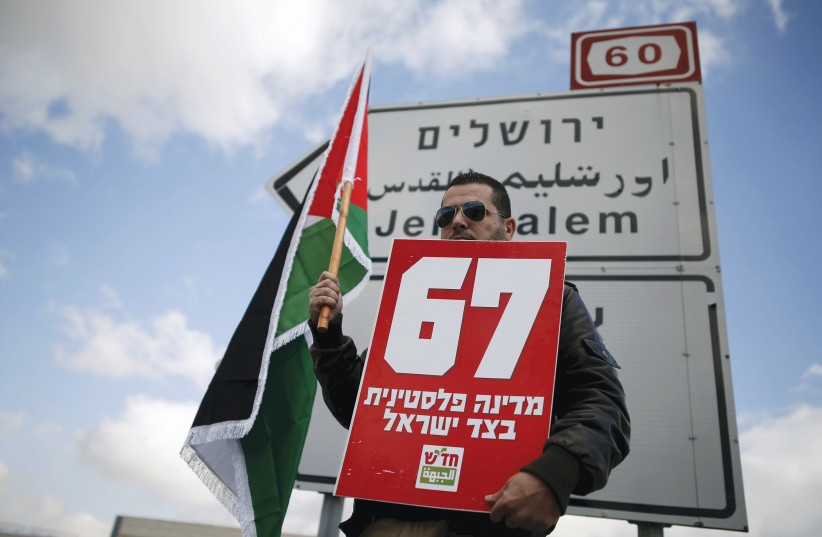A Palestinian state is the only way to secure the Zionist vision for Israel, Uri Zaki, former chairman of the executive board of the Meretz Party, told Jerusalem Post Editor-in-Chief Zvika Klein.
Explaining his opposition to annexation on Zionist grounds, Zaki said, "Once you annex the West Bank or Gaza, you annex a huge population of Palestinians. The two pillars of the Zionist movement from day one, were democracy and a Jewish homeland. And you can't have them both when you don't have a Jewish majority."
One possible solution in theory is a massive influx of new American Jews, but that might not be enough.
"Even if [one million American Jews] come, it won't secure a Jewish majority in Israel," Zaki said. "We have to have a compromise. A Palestinian state is the only insurance for the Zionist model to keep working for decades to come."
Uri Zaki: Being left-wing and a Zionist is no contradiction
Zaki is a known activist on the Left and is the former CEO of the far-left NGO B'Tselem, and has long been a critic of the Israeli government. Despite this, he is a proud Zionist and disagrees with those who label Israel an apartheid state.

"I criticize my government a lot. I think we have some basic problems here in Israel," he explained. "But at the end of the day... we have a liberal democracy, and I'm proud of it and I'm fighting for it 800%."
Progressive US Jews struggle following October 7
Views towards Israel among US progressives following the October 7 massacre and the start of the Israel-Hamas War have caused many progressive Jews to feel alienated, Zaki noted.
"I think most American Jews do understand the complexity of the situation, and understand that first and foremost, Israel is fighting for its defense in a very hostile environment," he explained, adding, "But on the other hand, they find themselves hit by backlash from the larger progressive community in the United States."
This viewpoint among many in the greater US progressive sphere is that "Israel is the villain," Zaki said.
This is a major problem for American Jews, who have often traditionally been at home voting for the Democrats.
But Zaki said that the Democratic Party as a whole is still on Israel's side.
"I think that at the end of the day, the mainstream Democratic Party is very much in the same spot as the American Jewish community, meaning we support Israel, support Israel's right to defend itself," he explained. He further cited how US President Joe Biden and his administration were very vocal in their support for Israel in its was with Hamas.
"Jews feel very comfortable in the Democratic Party," Zaki said.
However, many Jews still feel unsafe. Progressives make up the largest chunk of Jews in North America, and reflect the mainstream opinion of American Jewry, Klein noted, asking Zaki if anything has changed for them after October 7.
The activist answered that yes it has, with the Hamas massacre and resulting spike in antisemitism sparking existential fears that had been hidden for the past 50 years.
"Jews felt very comfortable in the United States," he explained. "If there were fears, they were more from the extreme Right. Now they see that, even in what they regard as their own communities, some of their friends - some of my personal friends - all of a sudden started to attack Israel in such a vicious way that you can see elements of antisemitism. And I think for the first time in many, many decades, you see a Jewish community that is concerned, less self-confident about it being part of the United States. All of a sudden, they're Jews [American Jews, rather than Americans who are Jewish]. And they haven't been Jews in that sense for so many years."
Has Israel's progressive sphere been fractured following October 7?
Following October 7, Israel's progressive wing is in full agreement with the rest of the country regarding Israel's right to defend itself and go to war with Hamas. On other matters, though, major gaps remain.
In particular is the continued belief in a two-state solution.
"I am fully defense and security oriented in my political judgement about what needs to be done, Zaki said. "On the other and, I do believe that in the long run and even in the medium rum, you don't have any other solution but a political solution vis-à-vis the Palestinians."
He further noted that he predicted violence would erupt with the Palestinians, though not at the scale it did on October 7.
Many progressives in Israel also firmly blame the Netanyahu government for the current situation.
"The Palestinian motivation [for violence] was going to be there unless you do something politically," Zaki said. "But this government and this prime minister, in power for the last 15 years, kind of pushed the situation to where he [Prime Minister Benjamin Netanyahu] basically preferred Hamas over the Palestinian Authority, preferred a radical Islamic terrorist organization that doesn't see any future with Israel to a nationalistic Palestinian government."
However, security remains an important factor.
"I'm very tough when it comes to security [and] dealing with terrorist groups," Zaki said. "I think we need to be very tough with Hamas, and Hamas can't stay as a force in Gaza or in the Palestinian political spectrum. I don't think that we can afford having Hezbollah as it is right now. We have to deal with them too. And of course, we have to deal with Iran. That's all correct, but we have to have a political solution with the Palestinians, because that's the only assurance we have to maintain the Zionist model."
